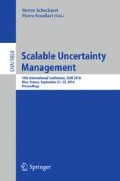Abstract
Argumentation frameworks have to be evaluated with respect to argumentation semantics to compute the set(s) of accepted arguments. In a previous approach, we proposed a fuzzy labeling algorithm for computing the (fuzzy) set of acceptable arguments, when the sources of the arguments in the argumentation framework are only partially trusted. The convergence of the algorithm was proved, and the convergence speed was estimated to be linear, as it is generally the case with iterative methods. In this paper, we provide an experimental validation of this algorithm with the aim of carrying out an empirical evaluation of its performance on a benchmark of argumentation graphs. Results show the satisfactory performance of our algorithm, even on complex graph structures as those present in our benchmark.
Access this chapter
Tax calculation will be finalised at checkout
Purchases are for personal use only
Notes
- 1.
Here, we suppose that the agent is optimistic. To represent a pessimistic behaviour, we should use the \(\min \) operator, for example.
- 2.
- 3.
The dataset is available at http://www.dmi.unipg.it/conarg/dwl/networks.tgz.
- 4.
- 5.
The Sophia Antipolis dataset is available at https://goo.gl/pN1M9r.
References
Baroni, P., Caminada, M., Giacomin, M.: An introduction to argumentation semantics. Knowl. Eng. Rev. 26(4), 365–410 (2011)
Bistarelli, S., Rossi, F., Santini, F.: A first comparison of abstract argumentation systems: a computational perspective. In: Proceedings of the 28th Italian Conference on Computational Logic, pp. 241–245 (2013)
Bistarelli, S., Rossi, F., Santini, F.: Benchmarking hard problems in random abstract AFs: the stable semantics. In: Proceedings of the Computational Models of Argument, COMMA 2014, pp. 153–160 (2014)
Bistarelli, S., Rossi, F., Santini, F.: A first comparison of abstract argumentation reasoning-tools. In: 21st European Conference on Artificial Intelligence, ECAI 2014, pp. 969–970 (2014)
Cabrio, E., Villata, S.: NoDE: a benchmark of natural language arguments. In: Proceedings of the Computational Models of Argument, COMMA 2014, pp. 449–450 (2014)
Caminada, M.: On the issue of reinstatement in argumentation. In: Fisher, M., van der Hoek, W., Konev, B., Lisitsa, A. (eds.) JELIA 2006. LNCS (LNAI), vol. 4160, pp. 111–123. Springer, Heidelberg (2006)
Cerutti, F., Giacomin, M., Vallati, M., Zanella, M.: An SCC recursive meta-algorithm for computing preferred labellings in abstract argumentation. In: Proceedings of the Fourteenth International Conference Principles of Knowledge Representation and Reasoning, KR 2014 (2014)
da Costa Pereira, C., Tettamanzi, A., Villata, S.: Changing one’s mind: erase or rewind? In: Proceedings of the 22nd International Joint Conference on Artificial Intelligence, IJCAI 2011, pp. 164–171 (2011)
Dung, P.M.: On the acceptability of arguments and its fundamental role in nonmonotonic reasoning, logic programming and n-person games. Artif. Intell. 77(2), 321–358 (1995)
Jakobovits, H., Vermeir, D.: Robust semantics for argumentation frameworks. J. Log. Comput. 9(2), 215–261 (1999)
Paglieri, F., Castelfranchi, C., da Costa Pereira, C., Falcone, R., Tettamanzi, A., Villata, S.: Trusting the messenger because of the message: feedback dynamics from information quality to source evaluation. Comput. Math. Organ. Theor. 20(2), 176–194 (2014)
Vallati, M., Cerutti, F., Giacomin, M.: Argumentation frameworks features: an initial study. In: 21st European Conference on Artificial Intelligence, ECAI 2014, pp. 1117–1118 (2014)
Verheij, B.: Artificial argument assistants for defeasible argumentation. Artif. Intell. 150(1–2), 291–324 (2003)
Zadeh, L.A.: Fuzzy sets. Inf. Control 8, 338–353 (1965)
Author information
Authors and Affiliations
Corresponding author
Editor information
Editors and Affiliations
Rights and permissions
Copyright information
© 2016 Springer International Publishing Switzerland
About this paper
Cite this paper
da Costa Pereira, C., Dragoni, M., Tettamanzi, A.G.B., Villata, S. (2016). Fuzzy Labeling for Abstract Argumentation: An Empirical Evaluation. In: Schockaert, S., Senellart, P. (eds) Scalable Uncertainty Management. SUM 2016. Lecture Notes in Computer Science(), vol 9858. Springer, Cham. https://doi.org/10.1007/978-3-319-45856-4_9
Download citation
DOI: https://doi.org/10.1007/978-3-319-45856-4_9
Published:
Publisher Name: Springer, Cham
Print ISBN: 978-3-319-45855-7
Online ISBN: 978-3-319-45856-4
eBook Packages: Computer ScienceComputer Science (R0)

